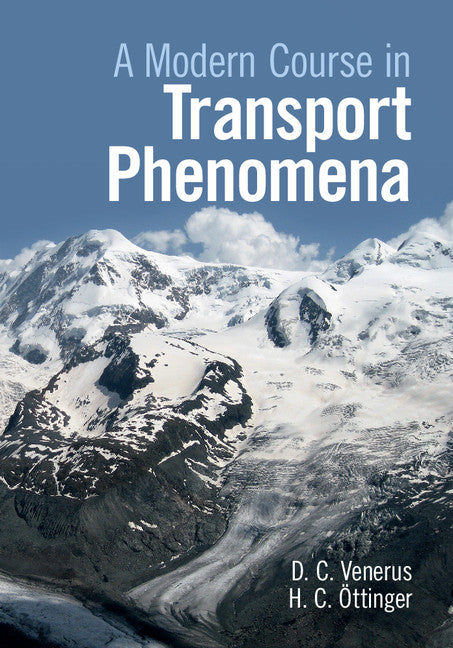Freshly Printed - allow 8 days lead
Couldn't load pickup availability
A Modern Course in Transport Phenomena
Integrating nonequilibrium thermodynamics and kinetic theory, this unique text presents a novel approach to the subject of transport phenomena.
David C. Venerus (Author), Hans Christian Öttinger (Author)
9781107129207, Cambridge University Press
Hardback, published 15 March 2018
534 pages
25.4 x 18 x 2.8 cm, 1.21 kg
This advanced text presents a unique approach to studying transport phenomena. Bringing together concepts from both chemical engineering and physics, it makes extensive use of nonequilibrium thermodynamics, discusses kinetic theory, and sets out the tools needed to describe the physics of interfaces and boundaries. More traditional topics such as diffusive and convective transport of momentum, energy and mass are also covered. This is an ideal text for advanced courses in transport phenomena, and for researchers looking to expand their knowledge of the subject. The book also includes: • Novel applications such as complex fluids, transport at interfaces and biological systems, • Approximately 250 exercises with solutions (included separately) designed to enhance understanding and reinforce key concepts, • End-of-chapter summaries.
1. Approach to transport phenomena
2. The diffusion equation
3. Brownian dynamics
4. Equilibrium thermodynamics
5. Balance equations
6. Forces and fluxes
7. Measuring transport coefficients
8. Pressure-driven flow
9. Heat exchangers
10. Gas absorption
11. Driven separations
12. Complex fluids
13. Thermodynamics of interfaces
14. Interfacial balance equations
15. Interfacial force-flux relations
16. Polymer processing
17. Transport around a sphere
18 Bubble growth and dissolution
19. Semi-conductor processing
20. Equilibrium statistical mechanics
21. Kinetic theory of gases
22. Kinetic theory of polymeric liquids
23. Transport in porous media
24. Transport in biological systems
25. Microbead rheology
26. Dynamic light scattering
Appendix A: thermodynamic relations
Appendix B: differential operations in coordinate form.
Subject Areas: Aerospace & aviation technology [TRP], Environmental science, engineering & technology [TQ], Engineering thermodynamics [TGMB], Chemical engineering [TDCB], Thermodynamics & heat [PHH], Condensed matter physics [liquid state & solid state physics PHFC], Physics [PH]


